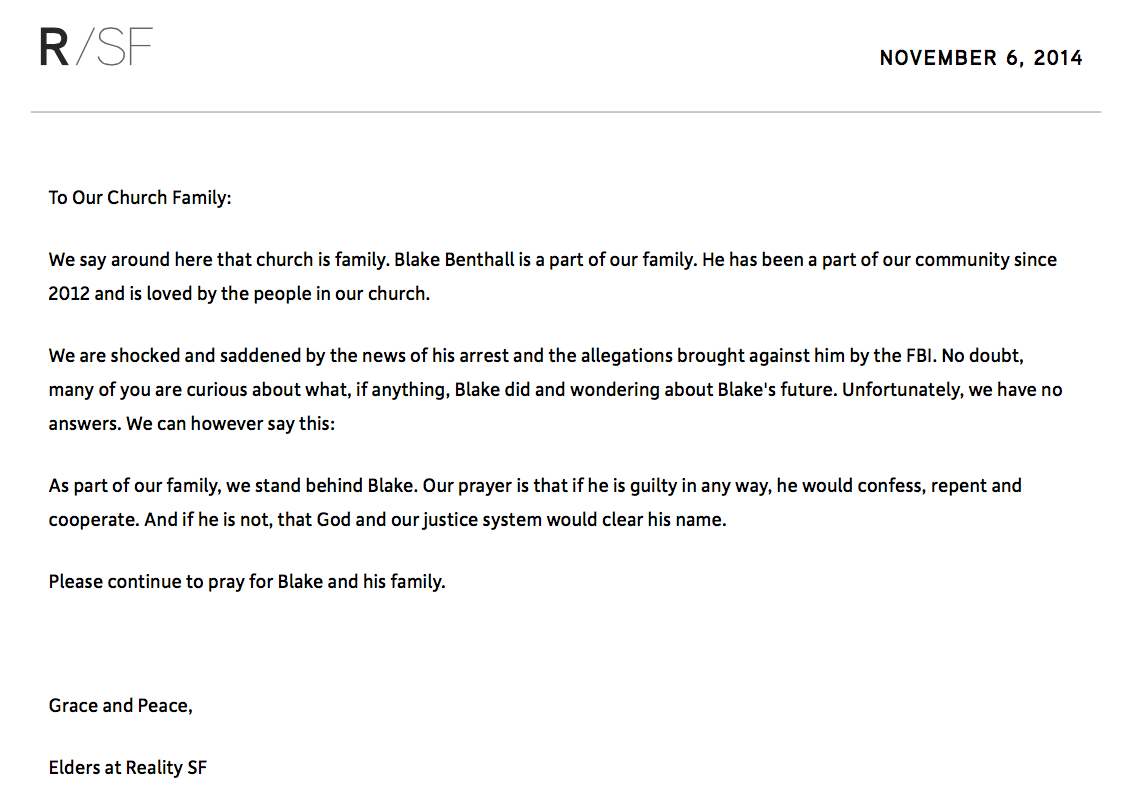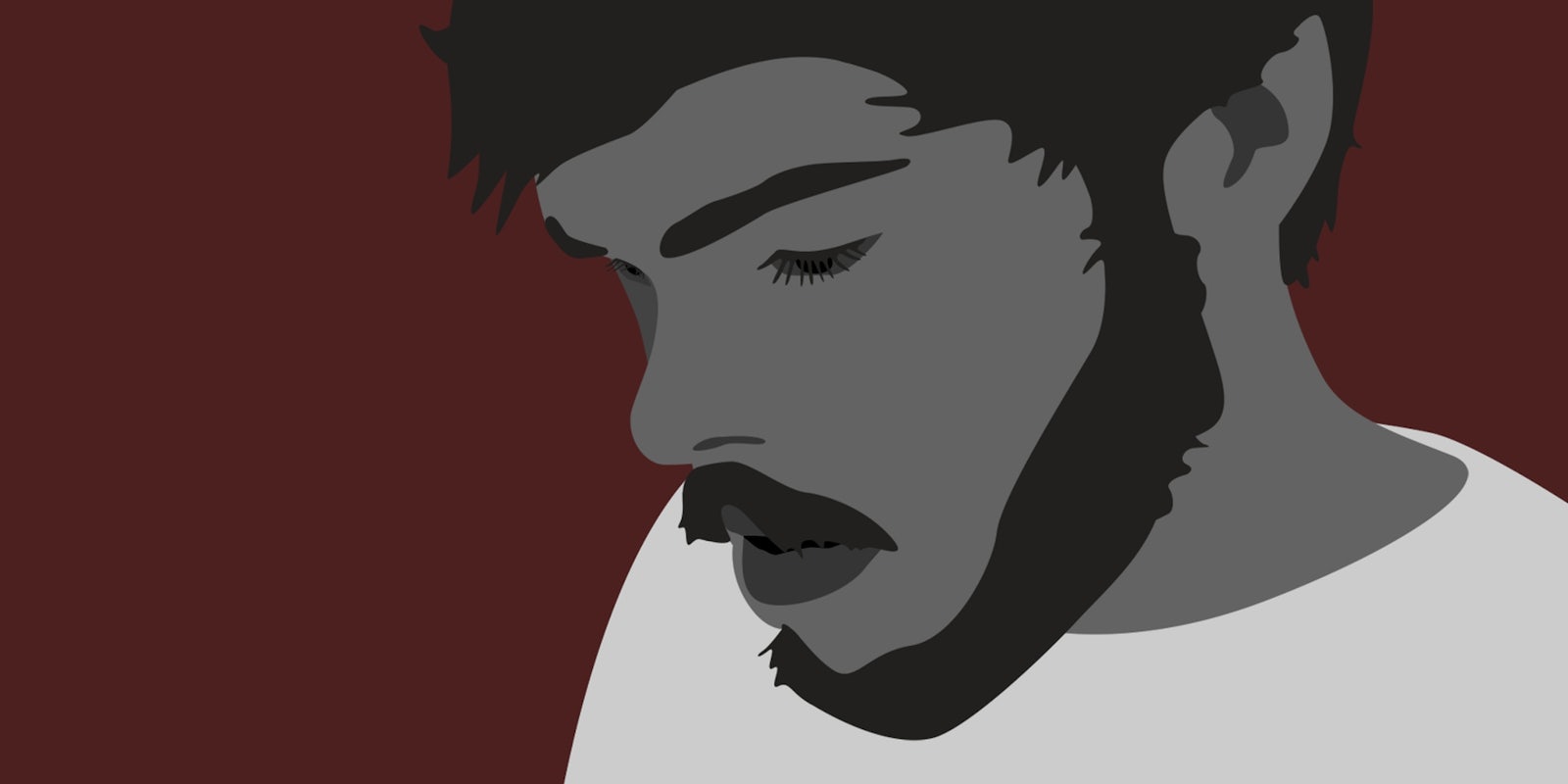Shortly before 1.30pm on Wednesday, Nov. 5, Teddy Worcester was cycling home through San Francisco’s Mission District when he noticed an entire block around Florida Street had been closed off, and was swarming with more than a dozen Federal Bureau of Investigation (FBI) agents. They were combing through his neighbor’s new $127,000 Tesla Model S, and when Worcester asked what was going on, he was told only to “keep moving along.”
The scene was “relatively quiet,” Worcester told the Daily Dot, and “the agents seemed to have a calculated plan.” Bemused, Worcester snapped a photo at 1.27pm and uploaded it to Twitter with the hashtag #mystery.
Worcester would soon have his answer: The law had come for Blake Benthall.
there were about 20 FBI agents searching my neighbor’s tesla and suv earlier today in the mission. #mystery pic.twitter.com/o5YZmFnKpO
— Teddy Worcester (@teddy) November 6, 2014
Benthall, 26, stands accused of running a multi-million dollar online drug marketplace often called Silk Road 2.0 under the pseudonym Defcon. A notorious Dark Net marketplace selling—among other things—vast quantities of illegal drugs, Silk Road 2.0 was one of just over a dozen similar sites shut down by American and European law enforcement last week. Benthall remains in FBI custody, and if found guilty on charges ranging from criminal conspiracy to conspiring to commit narcotics trafficking, could face decades—if not life—behind bars.
According to conversations with friends, coworkers, and other acquaintances, Benthall could not have a more unlikely background for someone the FBI paints as the leader of one of the Dark Net’s largest illegal drug bazaars.

Hailing from Houston, Texas, Blake Benthall had a fiercely Christian and traditional upbringing. He was homeschooled and taught to stay far away from the vices of life. “In the conservative evangelical Christian culture we grew up in,” an old friend of Benthall’s told the Daily Dot, “it is normal for people to abstain completely from alcohol and tobacco because of their beliefs. So drugs, even marijuana, are absolutely bad. There is no debate, no questioning the idea that drugs are under no circumstances OK.”
“It’s the kind of thing we joked about,” the friend, who asked to remain anonymous, said, “because it seemed to be patently absurd that any of us would do or deal drugs, of any kind.”
After Texas, Benthall moved to Florida, where he attended Florida College, a private Christian school, between 2007 and 2008. It’s likely that it was here that his horizons first broadened significantly. He acted in college theatre groups, played in bands, and went on to travel extensively across the country—couch surfing with “friends, acquaintances, and strangers” while working out of coffee shops as a freelance programer. Benthall had “founded [his] first Web business at age 15,” an archived version of his personal website reveals, and he relished the freedom this nomadic lifestyle brought, turning down multiple job offers from recruiters.
While at school, Benthall remained on good terms with his family, continuing to visit Texas, and recent photos on his Facebook profile show him with parents. “It’s amazing how many people guilt me for missing just one week of SF events,” Benthall posted on Facebook in 2013. “Family > instagramability.” His parents have now reportedly traveled to San Francisco to support him.
Eventually, however, Benthall succumbed to the recruiters, accepting their offer to pay for his relocation to California. He took a job at RPX, a software patent company in San Francisco. “We were really excited about him,” a former coworker recounts. Though largely self-taught, Benthall was an accomplished coder, and was to be the youngest person in the office. The coworker, who also asked to remain nameless, says Benthall was “really passionate” about his work, “adamant about doing things the right way,” and was enjoyable to work with.
(An unconfirmed Reddit post by someone claiming to be a former coworker claims he was “a terrible team player at work.”)
This was in 2011, and by this point, Benthall was showing signs of interest in the politics and technologies that would comprise the building blocks of Silk Road 2.0. Though he identified as a libertarian long before moving to California—Benthall is member of the dormant Facebook groups Homeschoolers for Ron Paul and Florida College Students for Ron Paul—in August 2014, he asked his friends to introduce him to “the most libertarian people [they] know,” with the intention of starting “a very libertarian finance startup.”
He made clear in discussions with coworkers while at RPX that he thought “Bitcoin was the future of money, no doubt about that,” Benthall’s coworker said, and describes himself on his Twitter profile as a “bitcoin dreamer.” He also considered exiled National Security Agency (NSA) whisteblower Edward Snowden a “hero.”
how the heck do I get an apartment when every LA landlord just stares blankly at my bitcoin balance and asks for pay stubs #workforbtc
— Blake Benthall (@blakeeb) January 16, 2014

Though he wasn’t a prominent figure, Benthall was known within the San Francisco party scene, and local news reports say he and his two housemates threw “[occasional] loud parties,” to which he would invite his neighbors. Another friend the Daily Dot spoke to who asked to remain anonymous was evasive over whether he takes drugs himself (a 2008 photo found by Business Insider shows Benthall reading a book called Pot Stories For the Soul)—although he wasn’t teetotal by any means. Esmeralda Gonzales runs a bar in Houston where Benthall would hang out and drink when he went back to visit his family in Texas. “He seemed like a really nice, normal guy,” she says. “He was funny but also pretty quiet. Nothing he ever did would have made me think that he’d be involved in something like this.”
Interestingly, the New York Post claims Benthall “recently swore off booze” altogether.
Regardless of whether Benthall takes drugs himself (or merely helped distribute them, if the FBI’s allegations are true), his faith never faltered—even with his broadened political horizons. Religion remained a prominent part of the 26-year-old’s life after he moved to San Francisco. He read the Bible with the 85-year-old neighbor who rented her driveway to him. And in 2012, he began attending the Reality/San Francisco church: A message circulated to the congregation after his arrest describes him as a “part of our family,” and that they “stand behind” him.
“Our prayer is that if he is guilty in any way, he would confess, repent and cooperate,” the letter adds. “And if he is not, that our justice system would clear his name.”

(Click to see the full-size image)
Since the arrest, there has been an outpouring of support for Benthall, with dozens of messages left on his Facebook profile by friends and congregation members.
“I’m praying for you and your family,” writes one well-wisher. “We all love you dearly and God is with you every step of the way.”
“Continue to find strength in God,” implores another.
“Praying for you, Blake,” says a third. “The rabbit hole is a dangerous thing.”

For all his self-described libertarianism, Benthall remains keenly interested in social issues. A recent Facebook post of his laments the rising cost of living in San Francisco and celebrates rent control, and he has a long history of charitable work. Shawn Sanchez, a pastor now working at Project Bay View, was the event coordinator for a Christian ministry for six months in 2012 and 2013 where Benthall volunteered, helping to feed “the lost and homeless of San Francisco.”
“Blake volunteered his time going door to door to deliver food,” Sanchez told the Daily Dot. “He was a very likeable guy, funny and really interested in ministering to the broken.”
Benthall also helped maintain a charity’s website back in Texas, Business Insider reports, and in March 2014 posted on Facebook about a hackathon “for the homeless” in San Francisco.
More evidence of his charitable nature—as well as one of the few signs he had cash to spare—came in March 2014, when Benthall posted on Reddit that he was offering a 4 BTC bounty (about $2,500 at the time), to be donated to a water charity when the first Fortune 100 company begins accepting Bitcoin.
By all accounts, Blake Benthall is a fairly ordinary—albeit highly talented—guy in his late twenties. Small of stature, sandy-haired, with a receding hairline, he was highly musical: His Instagram account is littered with photos and videos of live shows he’s attended, including Coachella. He is a fan of Gorillaz, Thom Yorke and Dirty Projectors. “In love with music since the day [he] was born,” Benthall also plays keyboard and sings, and his SoundCloud account plays host to numerous original recordings, many clearly inspired by his Christian faith.
Videos posted to his Vine account reveal he is a keen fan of Breaking Bad—the acclaimed TV drama that charts the transformation of its protagonist Walter White from a mild-mannered schoolteacher to the wealthy kingpin of a powerful drug empire.
After RPX, Benthall worked at startup consultancy Carbon Five (whose clients include Disney and Square). The software engineer began working at astronautics company SpaceX, helping develop rocket flight software, in December 2013—around the same time he allegedly took over the reigns of Silk Road 2.0. Despite writing highly of the company online (describing it as “important for humanity’s progress”), Benthall left just a few months later because of “family issues,” though it is unclear what he meant. He went on to do freelance consultancy and ran a tech incubator called Codespike out of his home. His freelance clients included the secretive ex-Googler startup Close, Wired reports.
Benthall has a history of tinkering and software side-projects, building a phone-to-tweet app several years ago, and more recently took a “startup bus” to the SXSW conference in Texas, according to Wired, “creating a new business idea en route.” In September, the band Little Big Town released a tie-in Web game to promote their new album created by Benthall, and the programmer was also active on code-sharing site GitHub, coding in RubyOnRails.
Meanwhile, the net was closing around him.

The FBI had infiltrated Silk Road 2.0 from the very beginning, their criminal complaint reveals, and observed the administrator and the “second-in-command,” who went by Defcon, take responsibility for the ownership and management of the site from December 2013 onwards, after the original anonymous founder—”Dread Pirate Roberts 2”—bowed out. Defcon would come to control “all aspects of Silk Road 2.0,” the FBI alleges, “including … the computer infrastructure and programming code underlying the website; the terms of service and commission rates imposed on vendors and customers of the website; the small staff of administrators and forum moderators who have assisted with the day-to-day operation of the website; and the massive profits generated from the operation of the business.”
In May 2014, the FBI identified a foreign server as being a part of the marketplace’s infrastructure. Though controversy surrounds how they were able to locate this server—some allege a potentially illegal technique called “parallel reconstruction” was used, and others believe the Tor network itself may be compromised—once it was found, it was all over.
The server was, the FBI claimed, registered to a certain email address: blake@benthall.net. With that information, police began tracking Benthall’s Internet usage, noting Silk Road 2.0 administrator Defcon was active at the same times Benthall accessed the Tor network. They allege his Tesla—something Benthall’s neighbor Teddy Worcester says was his only outward sign of wealth—was paid for using the Bitcoin profits from Silk Road 2.0 sales commissions.
A former coworker saw Benthall on Monday, Nov. 3. There was no sign of anything amiss, they told the Daily Dot, and the pair made plans to meet up for drinks later in the week.
Two days later, the FBI moved in.

We know that Ross Ulbricht, the alleged operator of the first Silk Road, was arrested in a San Francisco library. We don’t yet know how or where Benthall was apprehended—the FBI told the Daily Dot that they “are unable to confirm further details on the circumstances of his arrest”—but it was presumably in San Francisco, given he was in the city only two days prior. It’s also likely that Benthall knew nothing of the investigation until the very moment the feds came knocking.
According to local news reports, Benthall was apprehended in his Tesla on his driveway by 20 armed FBI agents on Wednesday afternoon.
But did Blake Benthall do it? Currently remanded in custody, he has yet to make any public statement, and the response from his community has been one of utter shock and disbelief. A close friend of Benthall’s has posted on his own Facebook page that he “doesn’t know what to think,” and the reaction of those that the Daily Dot spoke to, most of whom asked to remain anonymous, was stunned amazement.
Pastor Shawn Sanchez said he was “very surprised to hear this news, [and it] totally contradicts the Christian faith he was an active member in.” An old friend of Benthall’s said they found “the situation so shocking because what he did seems so black-and-white bad, and Blake always seemed like a guy with his head on his shoulders and a guy who thought about his actions.”
“It doesn’t correlate to him as a person,” a former coworker said. “Maybe something happened to him, but … the risk and stupidity of it all just doesn’t make sense. I can’t imagine a person so young with so much potential to do so much in his field to throw it away on something like this.”
Echoing these sentiments, Falson Fatemi, who had worked with Benthall at Close—whose Internet address was reportedly surreptitiously used to host Silk Road 2.0—said on Twitter that she “just can’t believe this. I’ve worked with Blake in the past and this seems to out of character.”
Despite all of this, prosecutors claimed at an initial hearing late last week that Benthall “admits to everything.” The New York Post also reports that he is “fully cooperating.”
Perhaps most tellingly, a now-deleted post by Benthall’s girlfriend on his Facebook profile asked friends to pray for “a light sentencing,” and a subsequent message says Benthall is encouraged by the wave of support. He has asked that people read Psalms 40 for him.
Do not withhold your mercy from me, LORD;
may your love and faithfulness always protect me.
For troubles without number surround me;
my sins have overtaken me, and I cannot see.
They are more than the hairs of my head,
and my heart fails within me.
Be please to save me, LORD;
come quickly, LORD, to help me.— Psalms 40
If this is to be taken as an admission of guilt, a far more difficult question arises: Why did Blake Benthall do it?
The FBI’s criminal complaint alleges that Silk Road 2.0 was generating as much as $8 million-worth of sales every month (of which the site took a 4-8 percent cut)—but friends and former co-workers of Benthall say that he wasn’t overly money-orientated.
In a post on Hacker News in February 2014, Benthall railed against software engineers chasing massive paydays. “The size of one’s exit is far less important than the impact of one’s technology on the world,” he wrote. “I’m convinced that when I look back, I will clearly view the code I’ve written here [at SpaceX] to be way more important for humanity’s progress than the code I’ve written for entrepreneur’s selfish attempts at billion-dollar exits.”
And yet, within a month of writing that, he had left SpaceX, apparently to focus his efforts on Silk Road 2.0.
“I’d like to hear his justifications, because I feel certain he must have had some,” an old friend of Benthall’s told the Daily Dot. “I can’t imagine it being solely about the money. I don’t want to believe a guy like Blake, essentially a guy like me, would lose his moral compass so dramatically over money.”
Some would dispute this analysis: Over the weekend, allegations began circling that Benthall was behind the theft of around $1.4 million-worth of Bitcoin in early September 2014. The truth of this claim remains unproven.
Benthall was above all a “morally upstanding person,” a former coworker told me. He would not have believed the allegations had Benthall not apparently already confessed. “Either I was completely wrong about him,” they said, “or it was completely off the map.”
Is it possible Blake Benthall ran Silk Road 2.0 not for financial reasons, but because he honestly thought it was the right thing to do? The co-worker hesitated. “It’s possible, given his views about currency. … I don’t know too much about his libertarian views. … But yeah, I always got the sense that he was the kind of person who stood by his beliefs.”
Update 3pm ET, Nov. 11: Additional details of Benthall’s arrest added.
Correction: Esmeralda Gonzales’ bar is located in Houston, Texas. We regret the error.
Additional reporting by Aaron Sankin, Dell Cameron, Kevin Collier, and Taylor Hatmaker.
Illustration by Jason Reed.


